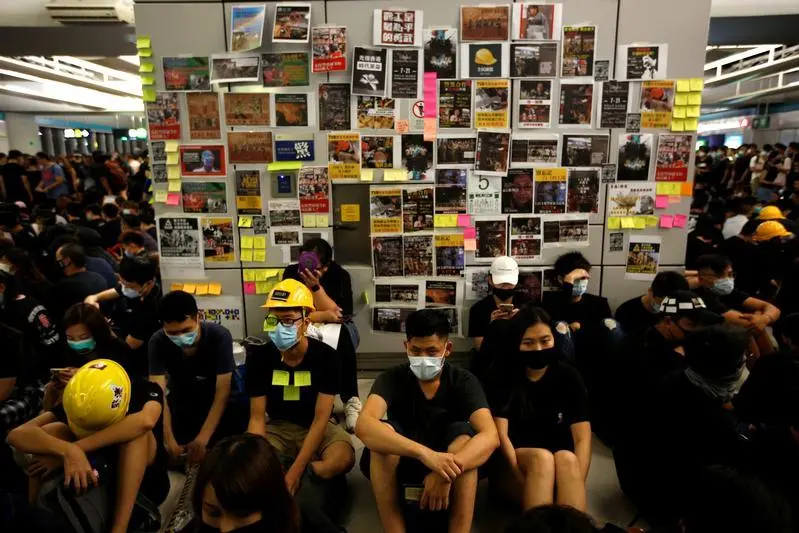PHOTO
HONG KONG - Beijing's hard line in Hong Kong should worry everyone else. President Xi Jinping had peaceful options to calm protesters. Instead state media accused them of treason and separatism; the army is on standby. That China would even consider sacrificing its only offshore financial centre to pander to nationalists suggests the onset of tragic policy–blindness.
The economic cost of an incursion would be stratospheric. Unlike Shanghai and Shenzhen, Hong Kong's stock market functions outside Chinese capital controls, providing a locally regulated alternative to New York and London for mainland firms to raise hard currency. In fact, the unrest prompted tech titan Alibaba to postpone a planned second listing in Hong Kong of up to $15 billion, according to a Reuters report on Wednesday.
The central government may be willing to pay the price. Should the territory’s Chief Executive Carrie Lam fail to get control of the situation before Oct. 1, a holiday celebrating the founding of the People's Republic, Xi may well send in the People's Armed Police to crush demonstrations.
Doing so would probably crash the world's fourth–largest stock market, with over $12 billion in daily turnover. It might scare away the hundreds of billions of dollars of foreign capital that flows through the city into mainland markets. The United States might revoke the Special Administrative Region’s exceptions from export controls and currency exchange applied to the rest of China.
Such a disaster might have been easily avoided. Yet Beijing, having ignored the conciliatory carrots it had at its disposal, may have trapped itself into using the stick nevertheless.
FAILURE OF IMAGINATION
To be fair, Xi did not pick this fight: Lam did by trying to ram through a bill allowing extradition to mainland courts. This prompted massive demonstrations that turned violent in June when she refused to back down. Xi has no need to open another trade war front with President Donald Trump, so Lam – probably under duress – abandoned the idea.
Yet she stubbornly refused to make the basically semantic concession of withdrawing the bill from the agenda permanently, as protesters wanted. Nor did she resign, which they had also demanded. The protests, and violence, intensified.
Beijing still had good options. It could have blamed Lam for the mess, forced her to resign, and let her replacement deal with the more controversial demands, including an investigation into police behaviour, and universal suffrage – which Beijing promised to deliver when it took control in 1997.
Instead Xi's government chose to back Lam and blame the protesters: they must be traitors, or foreign spies, or dupes. It rallied nationalist mainland youth – many of whom already resent Hong Kongers for looking down on them – by hinting the demonstrators wanted independence. State media started using the word "terrorism"; Beijing has detained a local employee of the British consulate in Hong Kong while travelling on the mainland, and implied it was retaliation for UK meddling.
It is now quite difficult for the central government to concede. It can hardly be seen as firing Lam to appease people it has implied are terrorists or CIA agents.
In a way, the crude response from Beijing is nothing new. The central government has long had a tin ear in Hong Kong. Liaison officials from the centre speak Mandarin, not the local Cantonese, in public speeches, even when trying to calm unrest. Beijing could easily hire emissaries fluent in the language, which has 60 million speakers, but it fears dialects are inherently separatist. An opportunity to show empathy, not dominance, is thus repeatedly wasted.
Nor has the Chinese Communist Party won friends by ignoring the city's acute economic imbalances: instead it lets a few wealthy families run virtual oligopolies in property, retail and finance.
However, under Xi Jinping the central government has become even more ham–handed, and more resistant to anything that might sound like dissent. "Do not misjudge the situation and mistake our restraint for weakness," said Yang Guang, spokesperson for the central government in Hong Kong – in Mandarin, of course – during an August press conference.
A government once dominated by economic pragmatists has developed a tantrum–reflex that is hobbling negotiations from Hong Kong to Brussels to Washington. The CCP is starting to see enemies everywhere. It’s a self-fulfilling prophecy.
CONTEXT NEWS
- Over two months of increasingly violent clashes between police and pro–democracy protesters have plunged Hong Kong into its worst political crisis since it reverted from British to Chinese rule in 1997.
– The protests began in opposition to a now–suspended bill that would have allowed the extradition of suspects for trial in mainland China. They have subsequently swelled into wider calls for democracy.
(Editing by Edward Hadas and Katrina Hamlin) ((pete.sweeney@thomsonreuters.com; Reuters Messaging: pete.sweeney.thomsonreuters.com@reuters.net))





















